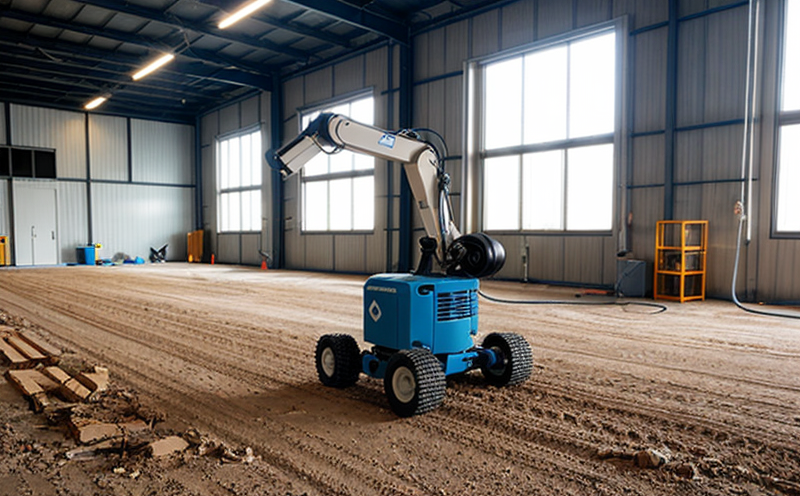IEC 60068-2-1 Cold Temperature Endurance Testing of Robots
The IEC 60068-2-1 standard is a crucial guideline for ensuring the reliability and robustness of robotic systems operating in cold environments. This test evaluates how well robots can withstand low temperatures, which is essential for industries such as automotive manufacturing, aerospace, and defense where robotics play a critical role.
At Eurolab, our comprehensive testing services ensure that your robots meet international standards and are fit for use in harsh environments. Our dedicated team of engineers meticulously follows the IEC 60068-2-1 protocol to simulate real-world conditions, ensuring accuracy and reliability in test results. The standard specifies a range of temperatures from -40°C down to -70°C, with durations that can last up to several hours.
For this particular testing method, the robot is subjected to controlled environmental conditions where the temperature gradually decreases over time. This gradual cooling allows for thorough observation and measurement of how well the robot operates under these conditions. Our state-of-the-art facilities include climate chambers equipped with precise temperature control systems that can maintain stability within a few degrees Celsius.
The testing process begins by preparing the robotic unit according to industry best practices, ensuring all components are in optimal condition before exposure to cold temperatures. During the test, various parameters are monitored closely, including but not limited to electrical performance, mechanical integrity, and operational functionality. Our engineers record detailed data throughout the experiment which serves as evidence of compliance with IEC 60068-2-1.
Compliance with this standard is vital for several reasons. Firstly, it ensures safety in potentially dangerous environments where human presence may be limited or impossible. Secondly, meeting these stringent requirements can enhance your product’s marketability by demonstrating its ability to perform reliably under extreme conditions. Lastly, adherence to such standards helps manufacturers avoid costly recalls and warranty claims associated with equipment failures.
Our team at Eurolab is committed not just to performing the tests accurately but also providing valuable insights based on our extensive experience in this field. By leveraging our expertise and advanced facilities, we help clients make informed decisions regarding product design improvements and potential applications for their robotics solutions.
Benefits
The benefits of IEC 60068-2-1 testing extend beyond mere compliance; they offer significant advantages that can positively impact your business operations. One key benefit is enhanced product reliability, which translates directly into increased customer satisfaction and loyalty. Knowing that your robotic systems will perform consistently in cold environments gives you peace of mind during deployment.
Another advantage lies in reduced risk management costs. By identifying potential issues early through rigorous testing, companies can minimize the likelihood of costly repairs or replacements down the line. Moreover, successful completion of these tests enhances brand reputation among clients who appreciate quality assurance measures implemented by reputable suppliers.
From a regulatory perspective, meeting IEC 60068-2-1 standards opens up access to international markets where stringent safety and performance criteria are enforced. This allows businesses to expand their reach without compromising on the integrity of their products. Furthermore, compliance with these globally recognized norms fosters trust between manufacturers and end-users.
Lastly, conducting thorough cold temperature endurance tests helps identify areas for innovation within your robotics projects. Understanding how different materials behave at low temperatures can lead to breakthroughs in material science or design optimization strategies that could revolutionize future generations of robotic technology.
Eurolab Advantages
At Eurolab, we pride ourselves on offering unparalleled expertise and cutting-edge facilities for IEC 60068-2-1 testing. Our team comprises highly skilled engineers with deep knowledge of robotic systems and their operational requirements under extreme conditions.
We employ advanced climate chambers that provide precise control over temperature settings, ensuring consistent results across multiple trials if needed. These chambers are equipped with state-of-the-art sensors capable of monitoring minute changes in environmental factors affecting the robot’s performance.
Our commitment to accuracy is reflected in our rigorous quality assurance processes throughout every stage of testing. From initial consultation through final report generation, we maintain strict adherence to both IEC 60068-2-1 specifications and international best practices. This attention to detail guarantees that clients receive reliable data they can trust when making critical business decisions.
In addition to technical excellence, Eurolab offers personalized service tailored specifically to each client’s needs. Whether you require one-off testing or ongoing support during development stages, our flexible approach ensures seamless integration into your workflow without disrupting project timelines.
By choosing Eurolab for your IEC 60068-2-1 cold temperature endurance tests, you benefit from a partner who understands both the technical challenges and strategic importance of ensuring reliable robotic performance in diverse operational scenarios.
Environmental and Sustainability Contributions
The pursuit of sustainability has become increasingly important across various industries. In robotics, adhering to environmental standards like IEC 60068-2-1 not only ensures product reliability but also supports broader goals related to reducing carbon footprints and promoting sustainable practices.
Robotic systems designed to meet these stringent environmental requirements contribute positively to the circular economy by encouraging efficient resource utilization. By developing products that can operate effectively even in challenging environments, manufacturers reduce waste associated with premature failures or obsolescence due to harsh conditions.
Maintaining compliance with IEC 60068-2-1 also supports efforts towards greener manufacturing processes. For example, selecting materials known for their durability and recyclability enhances overall sustainability metrics without sacrificing quality standards. Additionally, optimizing energy consumption during cold temperature endurance tests aligns closely with broader objectives aimed at minimizing environmental impact.
Furthermore, the data obtained from these tests can inform future innovations in robotics that prioritize both performance and eco-friendly design principles. This collaborative approach between industry leaders and regulatory bodies fosters an environment conducive to continuous improvement in sustainability practices within the sector.





